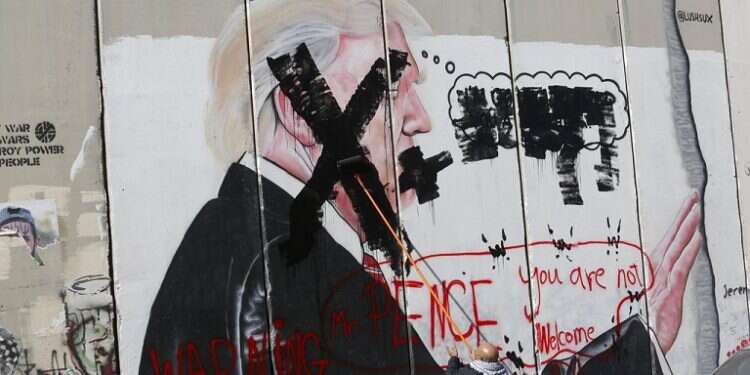U.S. Vice President Mike Pence's speech in the Knesset Monday drew fire from the Palestinians, with Palestinian Authority chief negotiator Saeb Erekat saying on Twitter that Pence's speech showed the U.S. administration was part of the problem rather than the solution.
"The messianic discourse of Pence is a gift to extremists," he wrote. "His message to the rest of the world is clear: Violate international law and resolutions and the U.S. will reward you."
Israeli analyst Amotz Asa-El said that Pence's speech was important in a practical sense because it set a deadline for the move.
He added: "I think that he [Trump] is making it plain to the Palestinians that their policy of protestation – which was visible in the plenum with the Arab lawmakers, but even more importantly in Abbas's absence and his journey to Brussels – that none of this is going to make America budge."
MKs from the Joint Arab List came to the Knesset plenum prepared to protest by making a pointed exit from the hall over the U.S.'s recent recognition of Jerusalem as the capital of Israel. Shortly after Pence began speaking, MKs from the faction raised protest signs showing a picture of Al-Aqsa mosque, captioned in Arabic and English: "Jerusalem is the capital of Palestine."
Knesset security intervened immediately and ushers escorted the protesting MKs from the plenum. Pence watched, smiling. Prime Minister Benjamin Netanyahu and a number of ministers and MKs from other parties turned their backs on the Arab lawmakers as they were being escorted out, while simultaneously applauding.
Later, Likud MK Oren Hazan approached Joint Arab List MK Jamal Zahalka, who was being interviewed on the ground floor of the Knesset, and shouted: "You're terrorists. I'm angry at whoever gave you a platform. Go to Gaza. We'll kick you to Gaza. You don't represent anyone. Who are you – just someone who supports terrorism."
When security personnel attempted to separate the two MKs, Hazan continued: "Why are you protecting him? I won't beat him up. Who are you, anyway, you terrorism sympathizer."
Defense Minister Avigdor Lieberman said that "members of the Joint Arabs List have proven once again that they are the representatives of terrorist organizations in the Israeli Knesset. Their disgraceful behavior showed everyone their lack of loyalty to the country and its symbols. Only if the Arabs of Israel allow others to represent them will there be a chance of peace."
Meanwhile, Palestinian Christians are saying that Pence's brand of evangelical Christianity, with its fervent embrace of modern-day Israel as the fulfillment of biblical prophecy, lacks their faith's compassion and justice, including for the Palestinians in Israeli-controlled territories.
Pence's speech to the Knesset was filled with biblical references. Pence and Netanyahu publicly rejoiced in the Trump administration's decision to recognize contested Jerusalem as Israel's capital.
The Jerusalem declaration and a subsequent Trump decision to curb aid to Palestinian refugees – both aligned with the Netanyahu government's agenda – had been top priorities for Pence.
The vice president – by his own definition "a Christian, a conservative, a Republican, in that order" – has cited his religious beliefs as the source of his unwavering support of Israel.
Palestinian Christians consider Christian Zionist views as a negation of the teachings of Jesus on justice and compassion for all of humanity. They argue that such streams of evangelical Christianity have used religion to whitewash Israeli policies toward the Palestinians.
"For me, it's a sick ideology," said Munib Younan, the recently retired bishop of the small Evangelical Lutheran Church in Jordan and the Holy Land and former president of the Lutheran World Federation, an umbrella for churches with millions of believers.
"When I say Jesus is love, they want my Jesus to be a political Jesus," Younan, 67, a Jerusalem-born Palestinian, said in a recent interview at his West Bank church.
Younan said he supports a just solution to the conflict with Israel, including the establishment of a Palestinian state along the pre-1967 borders – areas that include east Jerusalem, the West Bank and Gaza. Jerusalem should be shared by Christians, Muslims and Jews, he said, adding that a peace deal would enhance Israel's security.
In Bethlehem, Mayor Anton Salman said Pence's comments contradict his declared aim of helping Christians in the Middle East.
"He would need to change his thoughts and behavior … and recognize the rights of Arab Palestinian Christians who are the people of this land, to support their rights to have their independence, their freedom and east Jerusalem as our capital," said Salman, a Roman Catholic.




